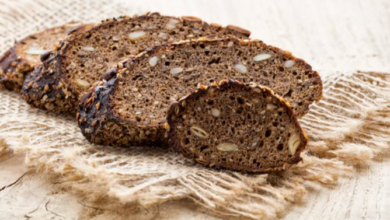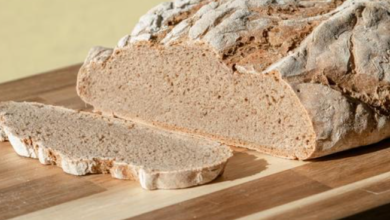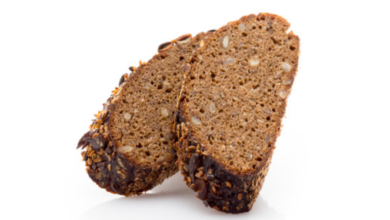Smart Choice Between Rye Bread Vs Rice: An Expert Opinion
What To Know
- Rice is a low-fiber grain, which can be a drawback for individuals seeking a fiber-rich diet.
- Both rye bread and rice can be included in a weight loss diet, but rye bread has a slight advantage due to its higher fiber content.
- If you prefer a gluten-free grain or require a quick source of energy, rice may be a better option.
In the realm of healthy eating, choosing the right carbohydrates is crucial. Rye bread and rice are two widely consumed staples, but their nutritional profiles differ significantly. This blog post delves into a comprehensive comparison of rye bread vs. rice, exploring their nutritional value, health benefits, and potential drawbacks to help you make informed dietary choices.
Nutritional Value
Rye Bread:
- Calories: 240 calories per 100 grams
- Carbohydrates: 49 grams per 100 grams
- Protein: 8 grams per 100 grams
- Fiber: 15 grams per 100 grams
- Vitamin B1: 8% of the Daily Value (DV)
- Vitamin B3: 10% of the DV
- Iron: 15% of the DV
- Magnesium: 17% of the DV
Rice:
- Calories: 280 calories per 100 grams
- Carbohydrates: 64 grams per 100 grams
- Protein: 7 grams per 100 grams
- Fiber: 1 gram per 100 grams
- Vitamin B1: 11% of the DV
- Vitamin B3: 5% of the DV
- Iron: 2% of the DV
- Magnesium: 1% of the DV
Health Benefits
Rye Bread:
- Improved Heart Health: Rye bread contains soluble fiber, which can help lower cholesterol levels and reduce the risk of heart disease.
- Stabilized Blood Sugar: Its high fiber content slows down the absorption of sugar into the bloodstream, preventing blood sugar spikes.
- Good Source of B Vitamins: Rye bread is rich in B vitamins, which are essential for energy production, brain function, and red blood cell formation.
- May Promote Weight Management: The fiber in rye bread promotes satiety, making you feel fuller for longer and potentially leading to weight loss.
Rice:
- Gluten-Free: Rice is a naturally gluten-free grain, making it a suitable option for individuals with celiac disease or gluten intolerance.
- High in Carbohydrates: Rice provides a quick source of energy, making it a popular choice for athletes and active individuals.
- Good Source of Vitamin B1: Rice is a good source of vitamin B1, which is important for healthy nerve function.
- May Support Digestion: The low fiber content of rice can be beneficial for individuals with sensitive stomachs or digestive issues.
Drawbacks
Rye Bread:
- May Cause Bloating and Gas: Rye bread contains FODMAPs, a type of fermentable carbohydrate that can cause digestive discomfort in some people.
- Not as Versatile: Rye bread has a denser texture than white bread, which may limit its use in certain recipes.
Rice:
- Low in Fiber: Rice is a low-fiber grain, which can be a drawback for individuals seeking a fiber-rich diet.
- Can Contribute to Weight Gain: Consuming large amounts of rice can lead to weight gain due to its high carbohydrate content.
- May Contain Arsenic: Rice can accumulate arsenic from the soil, which can be a health concern if consumed in large quantities.
Which is Better for Weight Loss?
Both rye bread and rice can be included in a weight loss diet, but rye bread has a slight advantage due to its higher fiber content. Fiber promotes satiety and helps control appetite, making rye bread a more filling option.
Which is Better for Blood Sugar Control?
Rye bread is the better choice for individuals seeking to control blood sugar levels. Its high fiber content slows down the absorption of sugar into the bloodstream, preventing blood sugar spikes.
Which is Better for Heart Health?
Both rye bread and rice contain heart-healthy nutrients, but rye bread has a slight edge due to its higher soluble fiber content. Soluble fiber can help lower cholesterol levels and reduce the risk of heart disease.
Wrap-Up: The Verdict
Choosing between rye bread and rice depends on your individual dietary needs and preferences. If you are looking for a fiber-rich, heart-healthy option that can help with weight loss and blood sugar control, rye bread is an excellent choice. If you prefer a gluten-free grain or require a quick source of energy, rice may be a better option. Ultimately, the best choice for you is the one that fits your dietary lifestyle and health goals.
Answers to Your Most Common Questions
1. Is rye bread healthier than white bread?
Yes, rye bread is generally healthier than white bread due to its higher fiber content and lower glycemic index.
2. Is rice a good source of protein?
No, rice is not a good source of protein. It contains a small amount of protein, but it is not a complete protein source.
3. Can I eat rice every day?
Consuming rice every day can be part of a healthy diet, but it is important to vary your grain intake to ensure you are getting a wide range of nutrients.
4. Is it better to eat rye bread or brown rice?
Rye bread has a higher fiber content than brown rice, but brown rice is a good source of whole grains and nutrients. The best choice depends on your individual dietary needs and preferences.
5. Can I substitute rye bread for rice in all recipes?
No, rye bread and rice have different textures and flavors, so they may not be suitable substitutes in all recipes.


